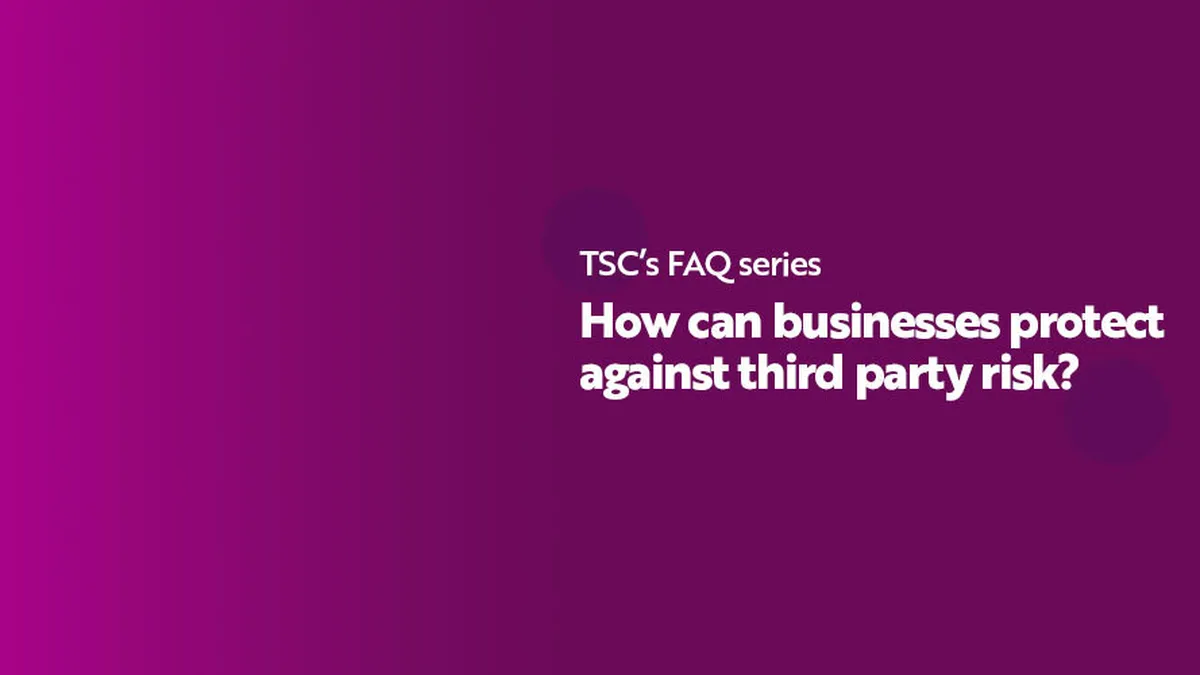
- Employee awareness
- 5 min read

Organisations are constantly exposed to a multitude of cyber threats and risks with third-party security a major area of attention.
Understanding and effectively managing third-party risks are crucial aspects of a robust cyber security strategy.
This article delves into the intricacies of third-party security, its importance, and the role of cyber security training and awareness in mitigating these risks.

At its core, third-party security encompasses the variety of risks and vulnerabilities stemming from the relationships an organisation maintains with external entities, including vendors, suppliers, and service providers.
When engaging with third parties, organisations inevitably find themselves in a dynamic exchange of sensitive information, data transfers, and resource sharing. While these collaborations are often essential for organisational growth and efficiency, they introduce a layer of complexity that can potentially expose the business to unforeseen cyber threats. This is because third parties often possess access to critical systems, databases, and proprietary information, rendering them potential targets malicious activities if not adequately secured.
Third parties inadvertently create potential entry points for cyber adversaries. External entities become integral components of the broader attack surface, and any compromise in their security posture can have far-reaching consequences for the primary organisation. Cybercriminals frequently target the weakest links in the chain, and third-party relationships represent potential weak points that demand vigilant safeguarding. The networks, systems, and data flows that extend into the domains of external partners necessitate a robust security strategy that comprehensively addresses potential vulnerabilities arising from these interdependencies.
Third-party risk management is crucial due to the growing reliance on external entities, such as vendors, suppliers, and service providers, which has become an integral part of modern business operations. While these external collaborations bring about numerous benefits, they concurrently expose organisations to a myriad of potential risks and vulnerabilities.
The implementation of robust third-party security measures requires careful consideration and adherence to a structured framework. Here are key steps to ensure a resilient defence against potential risks:
By weaving these steps into external collaborations, organisations not only protect their own assets but also contribute to a more secure digital ecosystem.

While the importance of third-party risk management is undisputed, organisations often encounter common challenges that can impede the implementation of security measures. Recognising and addressing these obstacles is crucial for ensuring the effectiveness of a comprehensive cyber security strategy.
By proactively addressing these common obstacles, organisations can strengthen their third-party risk management practices. Overcoming these challenges requires a combination of strategic planning, resource allocation, and a commitment to cultivating a security-conscious culture.
Cyber security is not only about technological solutions but also about empowering individuals within an organisation. Cyber security training and awareness play a crucial role in mitigating third-party risks by educating employees about potential threats, safe practices, and the importance of adhering to security protocols.
Employees should be trained to recognise phishing attempts, understand the risks associated with sharing sensitive information with third parties, and know how to report security incidents promptly. Fostering a culture of cyber security awareness encourages employees to actively contribute to the organisation's overall security posture.
Protecting against third-party risks is a multifaceted challenge that requires a combination of technological solutions, robust processes, and a well-informed workforce.
By implementing thorough risk management practices and prioritising cyber security training and awareness, organisations can significantly enhance their resilience against the evolving threats posed by third parties.
Partnering with a trusted cyber security training and awareness company, such as The Security Company Ltd. (TSC), is crucial. With 25 years of experience, TSC specialises in enhancing security behaviours, fostering a robust security culture, and raising awareness of threats and risks across global organisations.
The dynamic nature of cyber threats necessitates a comprehensive and adaptive cyber security strategy for UK law firms. By understanding the evolving threat landscape and investing in robust training and awareness initiatives, decision-makers can fortify their organisations against potential risks and cyberattacks.
At The Security Company, we specialise in boosting cyber awareness, targeted training, customised projects and role-based solutions. Through our tailored subscription services, targeted and customised eLearning and awareness materials and our behavioural assessments, we're committed to helping organisations like yours instil long-term, security-conscious behaviours.
Our method is distinct. We begin by diving deep into your team's current mindset, pinpointing lax behaviours, security gaps and departments in need of focus and attention. From there, we craft tailored solutions that encourage better cyber practices from your employees. With comprehensive training and seamless integration into your current systems, we're here to fortify your team against modern cyber threats and be your trusted cyber security and awareness partner.
Ready to take the next step?
We can help you to formulate an effective and comprehensive cyber security training and awareness program for your organisation year-round and be your dedicated partner for employee behaviour change and, ultimately, security culture change.
Do not hesitate to contact us for further information.



© The Security Company (International) Limited 2023
Office One, 1 Coldbath Square, London, EC1R 5HL, UK
Company registration No: 3703393
VAT No: 385 8337 51


